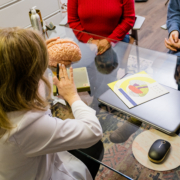Hemsworth raises awareness about genetic testing and dementia
It turns out Thor might be mortal after all.
More than anything else, that was the takeaway from a recent episode of “Limitless with Chris Hemsworth,” the NatGeo documentary series on longevity.
In the show, the Australian actor who plays Thor took a genetic test that revealed he has two copies of the gene APOE ε4, which is linked to an increased risk of Alzheimer’s disease. A recent Men’s Health magazine article thrust the issue like a hammer (see what we did there?) into the national zeitgeist.
This article, published October 3, noted that Dr. Peter Attia, who specializes in longevity and is the consulting doctor on “Limitless,” explained to Hemsworth that while this gene increases the risk of Alzheimer’s—making it somewhere between three and 10 times higher than everyone else’s—it’s doesn’t mean Alzheimer’s is a sure bet.
In other words, according to Dr. Attia, a patient can have the high-risk gene without ever developing the disease. Conversely, the same patient may not have the gene and can still develop Alzheimer’s.
Ten years ago, researchers knew of only 10 genes linked with Alzheimer’s. Today, scientists have identified more than 70 genetic regions associated with Alzheimer’s. The APOE gene is involved in making a protein that helps carry cholesterol and other types of fat in the bloodstream. Problems in this process are thought to contribute to the development of Alzheimer’s.
APOE ε4 increases risk for Alzheimer’s and is associated with an earlier age of disease onset in certain populations. A 2015 JAMA report indicates that with an allele frequency of 14 percent, APOE-ε4 is present in approximately 25 percent of the US population and associated with increased risk of Alzheimer’s Disease.
What’s more, a separate report from 2021 indicates that roughly 2 to 3 percent of those who carry APOE-ε4 actually carry two copies like Hemsworth does.
(We all always knew that Thor was an extraordinary specimen; for more on the research, click here.)
Risks associated with having APOE ε4 are manageable. On the “Limitless” show, Dr. Attia said he believes that with aggressive lifestyle adjustments one can reduce risk.
Specifically, Dr. Attia told the 40-year-old Hemsworth he considers Thor’s test result a blessing. “This will motivate you to take steps today that most people [in their 40s] would never think about until they’re in their 50s or 60s,” he told the star.
Hemsworth, in turn, responded with signature panache.
“It was a good kick in the arse and a reminder to do whatever is in my power to give myself the best fighting chance,” said Hemsworth. “Whatever work I’m doing for my brain health benefits the rest of my body—we turned it into a positive.”
In the article, Hemsworth added that he hopes sharing his news will inspire other people in similar situations to take better care of themselves.
Specifically, he told Men’s Health Executive Editor Ben Court that people in similar situations should “either go and get checked or to understand more about brain health and see what they have within their power to change.”
Hemsworth also cited impacts of focusing on certain areas of brain health, including diet and sleep.
To be clear, in most cases Alzheimer’s does not have a single genetic cause. Instead, it can be influenced by multiple genes in combination with lifestyle and environmental factors. According to the National Institutes of Health, a person may carry more than one gene or group of genes that can either increase or reduce the risk of Alzheimer’s.
Importantly, people who develop Alzheimer’s do not always have a history of the disease in their families. Still, those who have a parent or sibling diagnosed with the disease have a higher risk of developing Alzheimer’s than those without that association.
(Additional studies by NAN’s own Archives of Clinical Neuropsychology journal have established that APOE ε4 is connected with an increased likelihood of neurocognitive impairment following sports-related concussion, and that the presence of APOE ε4 can be a predictor of heterogeneity in cognitive function.)
It’s also worth noting that genetic tests are not routinely used in clinical settings to diagnose or predict the risk of developing Alzheimer’s or a related dementia. In some cases, if a person has symptoms at an early age with a strong family history of Alzheimer’s, a neurologist or other medical specialist may order a genetic test for rare single-gene variants known to cause the disease.
As mentioned earlier, although APOE testing is also available, the results cannot fully predict who will or won’t develop Alzheimer’s. Rather, this type of testing is used primarily in research settings to identify study participants who may have an increased risk of developing Alzheimer’s. This approach helps scientists look for early brain changes and compare the effectiveness of possible treatments for people with different APOE profiles.
In Hemsworth’s case, it also makes for great TV, and an impetus for change.
This essay has been factchecked by members of NAN’s Publications Committee. For more about that process, click here.









